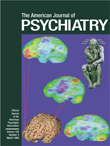Improved Cognition in Alzheimer’s Disease With Short-Term D-Cycloserine Treatment
Abstract
OBJECTIVE: Glutamatergic neurotransmission is important for memory and cognition and is severely affected in Alzheimer’s disease. d-Cycloserine exhibits partial agonist activity at the glycine site of N-methyl-d-aspartate subtype glutamate receptor, facilitating activation of the receptor and improving cognition and memory. METHOD: Seventeen patients with Alzheimer’s disease received a three-phase, double-blind, placebo-controlled trial of 50 mg and 100 mg/day of d-cycloserine. RESULTS:d-Cycloserine was associated with significant improvement in scores on the cognitive subscale of the Alzheimer’s Disease Assessment Scale (improvement of 3.0 points) when given at a dose of 100 mg/day. CONCLUSIONS:d-Cycloserine has cognitive benefits for patients with Alzheimer’s disease. (Am J Psychiatry 1999; 156:467–469)



